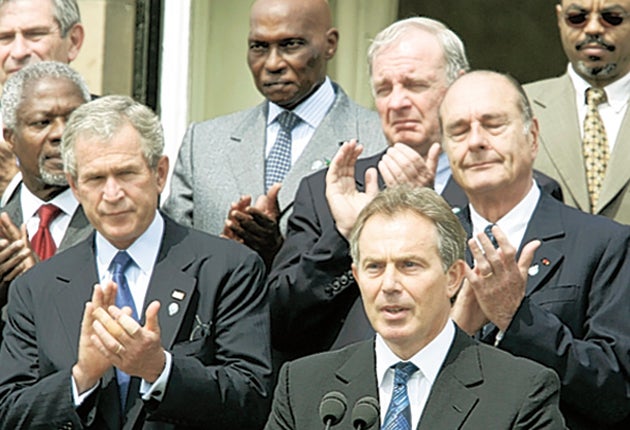Cameron wants G8 to keep promise on aid to poorest nations

Tomorrow, five years after their landmark summit in Gleneagles where the leaders of the world's richest nations agreed to double aid to the poorest countries by this year, the G8 club gathers in Deerhurst, Canada, amid growing embarrassment that the goal has not been met.
They will consider a progress report which shows that the G8 is $10bn (£6.7bn) short of the Gleneagles pledge to increase total aid to $50bn a year. When inflation is taken into account, the shortfall is $18bn. Italy and Japan are accused of dragging their feet, after squeezing their aid budgets following the global slowdown.
In contrast, Britain is on track to keep its promise to raise its share of national income devoted to aid to 0.7 per cent by 2013 – a Labour pledge which has been reiterated by the Conservative-Liberal coalition.
The Prime Minister, David Cameron, attending his first global summit, will tell the G8 leaders that they must keep their promises to boost aid to Africa. The draft communiqué for the summit makes no mention of the Gleneagles pledges but Mr Cameron, travelling to Canada today, is to press the other leaders to reiterate their "existing commitments".
"He believes it is more important to keep existing promises than launch another raft of initiatives," one British official said yesterday.
Last year, the UK spent 0.52 per cent of its GDP on aid (£7.7bn), a figure due to rise to 0.6 per cent this year. But Italy's contribution dropped from 0.29 per cent of GDP in 2005 to 0.16 per cent last year, while Japan's share fell from 0.19 in 2004 to 0.18 per cent last year. France spent 0.46 per cent of GDP on aid last year, Germany 0.35 per cent and the US 0.2 per cent.
Mr Cameron will on Saturday hold his first meeting with US President Barack Obama since becoming Prime Minister, in the margins of the G8 or the wider G20 summit in Toronto which will follow it.
They will discuss the Gulf of Mexico oil spill and tensions over BP. Yesterday Mr Cameron told MPs: "We want to ensure that the company remains strong and stable for not only our benefit, but the benefit of the US. I believe that 40 per cent of the company's shareholders are in the US, while 39 per cent are in the UK, and it employs more people in the US than it does in the UK, so it is in all our interests that it is strong and secure in the future."
And there could be differences over the global economy. Mr Cameron believes the deficit-cutting plan included in this week's Budget puts Britain in the mainstream of opinion in the G20. But Mr Obama, anxious about the stampede to cut spending in Europe, warned the group in a pre-summit letter that it should learn from "mistakes of the past, when the [fiscal] stimulus was withdrawn too quickly and resulted in renewed economic hardships and recession".
Mr Cameron's spokesman said yesterday that he would be pushing for structural reforms, such as flexible labour markets and a global trade deal, in order to secure global growth.
Join our commenting forum
Join thought-provoking conversations, follow other Independent readers and see their replies
Comments
Bookmark popover
Removed from bookmarks